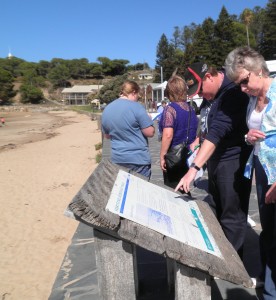
On Wednesdays the ‘Adult Literacy for People with a Disability’ class begins with a walk through paddocks and gardens surrounding the Encounter Centre in South Australia’s Victor Harbor.
‘We always start the day with exercise because it stimulates the brain and our students really enjoy it,’ says Leonie Mathews, co-ordinator of the Centre’s adult literacy program.
On an average day, 20 people arrive aged from 18 to 60 years. They’re a diverse group – some have intellectual disabilities, others have acquired brain injuries through strokes or accidents.
After the walk, the formal learning begins. Students write in their journals and talk with a tutor about what they’ve done during the week. This helps to develop their vocabulary and their reading and public speaking skills.
Some are shy about talking to the group. Leonie says encouraging students to present on a hobby or interest – whether it’s quilting, making model ships or fishing – breaks the ice. ‘It’s something they know and are interested in so it’s safe and they don’t have to talk about themselves directly. The students just love it. They listen closely to one another and ask questions and they share really useful information with the rest of the group.’
Improving communication skills and acceptance of one another is as important as improving literacy skills, Leonie says. ‘Some of students can be quite self-absorbed so learning to pay attention and be considerate of others is important. Smiling at people, offering to help, or thanking someone for something they’ve done might seem like small things, but they are big steps for some of our students. They’ve learned to look out for each other.’
Having a ‘wonderful’ group of 15 tutors working one on one and catering to the individual needs of students is what has made the program so successful Leonie says. ‘We’re all on the same wavelength and we get together at the beginning of the term to brainstorm and explore ideas, change the classroom set up, and decide on the best approach with individual students.’
Leonie’s advice for centres establishing a similar program is ‘Go for it. I hadn’t taught people with disabilities before so I was a bit unsure and worried before I started. But once you’ve established that there’s a need for a program like this, it’s a matter of getting alongside the students and getting to know the sort of things they respond to, and they will let you know what they need.’
Leonie says it’s been a pleasure watching students blossom. ‘The students are so responsive and so wanting to learn. And I’ve got this wonderful team of volunteers. I just love my job.’
Read more stories from Quest magazine.
